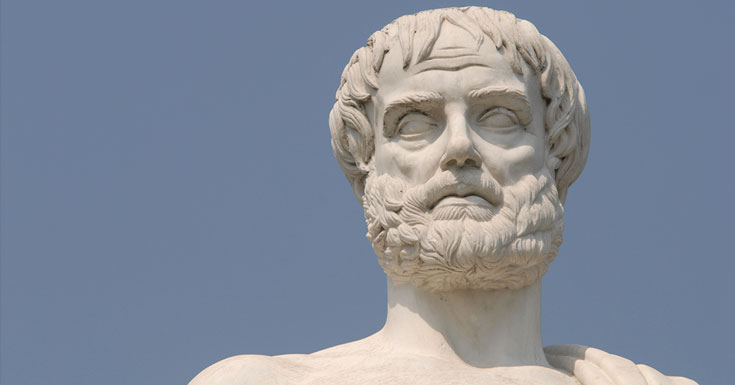Of Digital Transformation and Aristotle
Former Analyst

My thinking about the concept of Digital Transformation (DX) has evolved over the past few years. As a skeptic, I viewed the DX as just another buzzword, the use of which we would have to endure until it became embarrassing to do so publicly. As a theorist, I worked with others to understand, unpack, and refine a definition. And as a researcher, I collected data on and identified real-world examples of DX. More recently, I have been thinking practically about what it takes to transform an institution digitally. Ironically, my search for a pragmatic approach to DX has led me back to an old intellectual favorite – the ancient Greek philosopher, Aristotle.
Before I explain how Aristotle might help us think about DX in higher education, I should briefly explain how I came to think that ideas from the 4th century BCE can inform 21st century CE digital initiatives.
The one thing that has troubled (and continues to trouble) me about current DX conversations is the idea that there is some end to the process of DX in which an institution can be said to be entirely digitally transformed. The idea of DX as a goal that is an end unto itself is ubiquitous in contemporary treatments of DX as a journey (implying a destination) and in terms of the failure and success of DX initiatives (implying a known and measurable outcome against which efforts can be benchmarked). Even in my own research, I have suggested that an ideal “institution transformed by digital technologies and capabilities, as well as a correspondingly reshaped culture and workforce that are enabling new educational and operating models, strategic directions, and sources of value” is plausible. I am increasingly convinced that thinking about DX in this way is flawed and has serious implications for higher education institutions engaged in DX efforts.
First, the complexity of higher education institutions, even small ones, is a significant barrier to achieving comprehensive and institution-wide DX at any single point in time.
Second, even if an institution were able to achieve a perfect state of DX, it would be fleeting, disrupted by the emergence of new technologies, changes to the workforce, and the evolution of the institutional culture.
Third, we know from observation that the pace of digital transformation in higher education is notoriously slow. Student success is arguably the most advanced DX project in higher education, but it has taken nearly a decade to get where we are (and it is still not complete).
Fourth, the implementation of DX is necessarily uneven across an institution, with some units engaging in wholesale transformation while others remain untouched, a reality that contributes to the first issue above.
Fifth, DX is both a linear process of digitizing information followed by digitalizing processes before digitally transforming the institution and a recursive process that may require repeated iterations of steps along the way, some of which may be the entire point of DX.
So, what is the alternative to thinking about DX as an endpoint, especially for administrators who need to demonstrate the impact of their initiatives or project managers who need to determine when a project is complete. This is where a cursory consideration of Aristotle’s concept of virtues1 may provide a heuristic to think about, plan for, and assess the outcomes of DX endeavors in higher education.
In the Nicomachean Ethics, Aristotle defines virtue as a mean (middle) condition that resides between two states of vice, namely deficiency and excess. He provides some examples to illustrate the point:
| Deficiency (Vice) | Mean (Virtue) | Excess (Vice) |
|---|---|---|
| Cowardice | Courage | Rashness |
| Understatement | Truthfulness | Boastfulness |
| Cantankerousness | Friendliness | Flattery |
| Shamelessness | Modesty | Shyness |
To be virtuous requires intentional, repeated attempts to aim for the mean and avoid excess and deficiency. The state of being virtuous is both transitory (one may be virtuous in this instance, but not the next) and non-fungible (being virtuous in one domain does not mean one is virtuous in other domains). Finally, virtues are relative to the individual and their characteristics; a soldier’s courage looks vastly different from the courage of an ordinary citizen, although both lie between cowardice and rashness.
This brief treatment of Aristotle’s virtues suggests general lessons for institutions engaged in or considering DX initiatives:
- Avoid extremes and seek moderation. Digitization of everything is as absurd as a comprehensive rejection of technology; doing nothing is as untenable as doing everything at once.
- Be intentional. Some units and departments will benefit more than others from using digital tools to automate and streamline processes. Focus on the local problems to be solved while keeping an eye on the collective impact of those smaller projects on the institutional mission.
- Embrace relativity. The ability, desire, and need for DX will vary by institution. The scale and scope of DX at a doctoral-level institution will be different than that of a mid-sized community college and a small liberal arts college.
- Accept impermanence. The emergence of new technologies, the shifts in workforce composition, and the evolution of institutional culture are constants. DX projects will require indefinite support and constant maintenance.
There are likely better models for changing the way we think about DX than an oversimplified interpretation of an ancient Greek text. But, despite the serious thinking that some have done on the subject, we seem to have fallen back on more convenient understandings grounded in project management, strategic planning, and industrial hype that might serve to undermine the potential benefits of DX. Consider this essay an invitation to a conversation about how we might dislodge ourselves from those routinized patterns of thinking.
1 This exercise is by no means intended to suggest that DX is anything like an actual virtue qua Aristotle. That would be silly.
Categories
- Academic Administration
- Advancement
- Content Management
- CRM Platforms
- Customer Experience (CX)
- Cybersecurity
- Data Management and Analytics
- Enterprise Portals and Mobile Apps
- Event Management
- Finance
- HCM/HR
- IT Tools and Infrastructure
- Life at Tambellini
- Services
- Student
- Teaching and Learning
- Technology Leadership
- Thought Leadership
- Uncategorized
Share Article:

Other Posts From this Author:
© Copyright 2024, The Tambellini Group. All Rights Reserved.